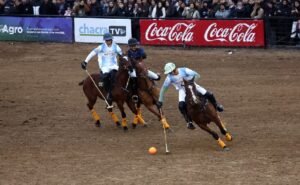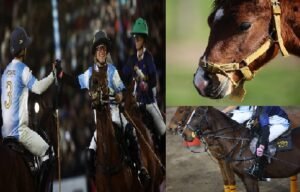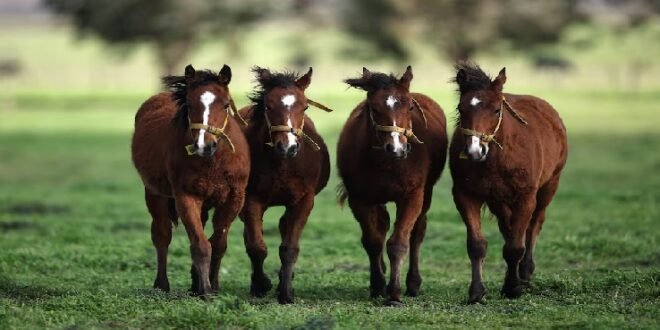01-09-2025
BUENOS AIRES: They look like ordinary foals, docile with honey brown coats and white facial patches, content to spend their days munching alfalfa in a cordoned-off pasture in rural Buenos Aires province but these five 10-month-olds are the world’s first genetically edited horses: cloned copies of a prize-winning horse named Polo Pureza, or Polo Purity, with a single DNA sequence inserted using CRISPR technology with the aim of producing explosive speed.
 Kheiron Biotech, the Argentine company that created the horses, says gene-editing has the potential to revolutionize horse breeding.
Kheiron Biotech, the Argentine company that created the horses, says gene-editing has the potential to revolutionize horse breeding.
While cloning creates a genetically identical copy, CRISPR functions as a sort of genetic scissors to cut and customize DNA.
The company, which specializes in equine cloning, used CRISPR to reduce the expression of the nystatin gene, which limits muscle growth. The idea was to increase the muscle fibers that allow for powerful movements and so transform the horses into sprinters but polo isn’t letting them in so fast.
While Argentina, regarded as the global capital of polo, has long welcomed reproductive technologies including cloning to breed elite horses, the sport’s national body and breeding association are putting up hurdles to prevent GE horses from joining the game.
The Argentine Polo Association has banned GE horses from competition.
“I wouldn’t like them to play polo,” said Benjamin Araya, the association’s president. “This takes away the charm, this takes away the magic of breeding. I like to choose a mare, choose a stallion, cross them, and hope that it will turn out very well” and the Argentine Association of Polo Horse Breeders told media it will monitor the horses for four or five years before making a decision on whether to register them as Argentine polo ponies.
Kheiron said it was confident the polo community would eventually come around. “The truth is that I’m not so worried about it,” Gabriel Vichera, the company’s scientific director, told media. “Educating, I think that’s what we have to keep doing.”
 It’s unclear how the sport’s national body would enforce a ban. Argentine regulations do not distinguish between cloned, GE and conventionally bred horses and neither does the polo association.
It’s unclear how the sport’s national body would enforce a ban. Argentine regulations do not distinguish between cloned, GE and conventionally bred horses and neither does the polo association.
Some breeders said that while they appreciate how clones can help preserve the bloodlines, gene-editing goes too far and could threaten their business.
“This ruins breeders,” said Marcos Heguy, a breeder and former professional polo player. “It’s like painting a picture with artificial intelligence. The artist is finished.”
Eduardo Ramos, who began breeding in the 70s, said that breeders had also been skeptical at first of other advances in biotech, such as embryo transplants and cloning.
“Science and technology will keep advancing,” he said. “Those who say this shouldn’t be done won’t be able to stop it.”
Polo, which originated in Central Asia, was brought to Argentina by British immigrants, who founded the first polo club in Buenos Aires in 1882. It’s somewhat like hockey on horseback, where two teams of four people each sweep long mallets to drive a ball through goal posts.
Its expensive players ride as many as a dozen horses per game and in Argentina, wealthy land-owning families have traditionally dominated the sport.
The country exported about 2,400 polo horses last year, according to government data, and the Argentine polo breed dominates prestigious competitions like the Queen’s Cup in England and the Argentine Open.
The sport has long used surrogates to carry embryos of polo-playing horses. And unlike horse racing, polo allows cloned animals. (Int’l Monitoring Desk)
 Pressmediaofindia
Pressmediaofindia




